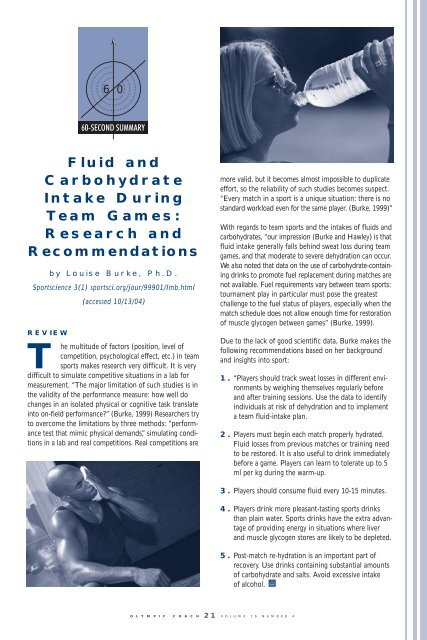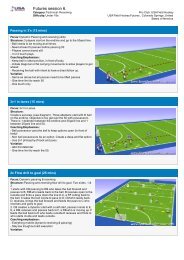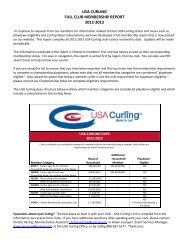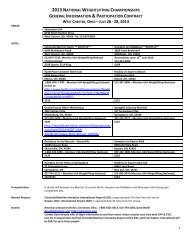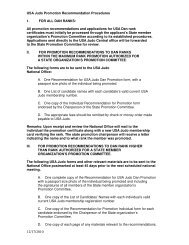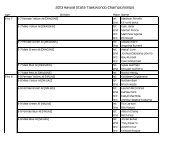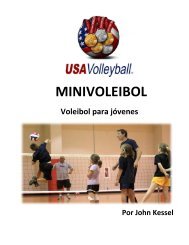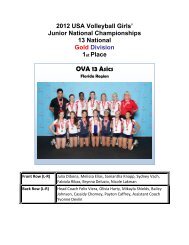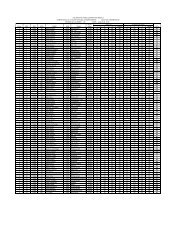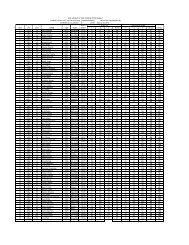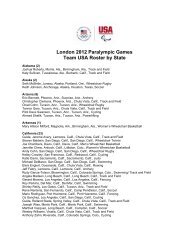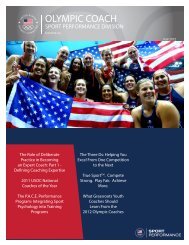OLYMPIC COACH - United States Olympic Committee
OLYMPIC COACH - United States Olympic Committee
OLYMPIC COACH - United States Olympic Committee
Create successful ePaper yourself
Turn your PDF publications into a flip-book with our unique Google optimized e-Paper software.
Fluid and<br />
Carbohydrate<br />
Intake During<br />
Team Games:<br />
Research and<br />
Recommendations<br />
by Louise Burke, Ph.D.<br />
Sportscience 3(1) sportsci.org/jour/99901/lmb.html<br />
REVIEW<br />
6 0<br />
(accessed 10/13/04)<br />
The multitude of factors (position, level of<br />
competition, psychological effect, etc.) in team<br />
sports makes research very difficult. It is very<br />
difficult to simulate competitive situations in a lab for<br />
measurement. “The major limitation of such studies is in<br />
the validity of the performance measure: how well do<br />
changes in an isolated physical or cognitive task translate<br />
into on-field performance?” (Burke, 1999) Researchers try<br />
to overcome the limitations by three methods: “performance<br />
test that mimic physical demands,” simulating conditions<br />
in a lab and real competitions. Real competitions are<br />
O L Y M P I C C O A C H 21 VOLUME 16 NUMBER 4<br />
more valid, but it becomes almost impossible to duplicate<br />
effort, so the reliability of such studies becomes suspect.<br />
“Every match in a sport is a unique situation: there is no<br />
standard workload even for the same player. (Burke, 1999)”<br />
With regards to team sports and the intakes of fluids and<br />
carbohydrates, “our impression (Burke and Hawley) is that<br />
fluid intake generally falls behind sweat loss during team<br />
games, and that moderate to severe dehydration can occur.<br />
We also noted that data on the use of carbohydrate-containing<br />
drinks to promote fuel replacement during matches are<br />
not available. Fuel requirements vary between team sports:<br />
tournament play in particular must pose the greatest<br />
challenge to the fuel status of players, especially when the<br />
match schedule does not allow enough time for restoration<br />
of muscle glycogen between games” (Burke, 1999).<br />
Due to the lack of good scientific data, Burke makes the<br />
following recommendations based on her background<br />
and insights into sport:<br />
1. “Players should track sweat losses in different environments<br />
by weighing themselves regularly before<br />
and after training sessions. Use the data to identify<br />
individuals at risk of dehydration and to implement<br />
a team fluid-intake plan.<br />
2. Players must begin each match properly hydrated.<br />
Fluid losses from previous matches or training need<br />
to be restored. It is also useful to drink immediately<br />
before a game. Players can learn to tolerate up to 5<br />
ml per kg during the warm-up.<br />
3. Players should consume fluid every 10-15 minutes.<br />
4. Players drink more pleasant-tasting sports drinks<br />
than plain water. Sports drinks have the extra advantage<br />
of providing energy in situations where liver<br />
and muscle glycogen stores are likely to be depleted.<br />
5. Post-match re-hydration is an important part of<br />
recovery. Use drinks containing substantial amounts<br />
of carbohydrate and salts. Avoid excessive intake<br />
of alcohol.


